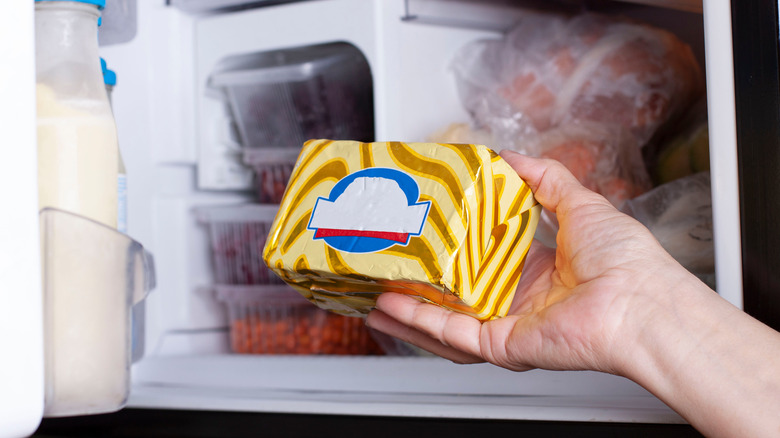Is It Safe To Eat Expired Butter?
There are certain dairy products like milk and yogurt that we are always concerned with going bad – no one wants to take a bite of cereal only to discover that their milk has turned a few days prior. Unsurprisingly, all dairy products have a shelf life, including fridge staples you may not be as concerned about, like butter. That's right, your butter can and does expire. Food safety expert Matt Regusci told Reader's Digest, "While all fats have a fairly long shelf life, butter has a lot of milk solids that make it go rancid, or spoil, faster."
While it makes sense that this dairy product made of extra-churned heavy cream will go bad after a particular time, many people are unsure how long you can store butter before it is no longer safe to eat.
There is no hard and fast rule when deciding if your butter is still okay to consume, even if the expiration date printed on the container has passed. Butter is generally safe to eat up to a month after its printed expiration date, but check for certain giveaways like its color, smell, and taste to see if it has spoiled beyond redemption. The best-by date refers to butter stored in the fridge in an airtight container, so the actual shelf life can vary drastically depending on how you store it.
Can you use expired butter?
Here's the good news: If you notice that your butter's expiration date has passed but you don't have time to run down to the store for a new tub, you can still eat it with relative safety as long as you inspect it first. When deciding if you are comfortable eating butter that has been lingering in your fridge for far too long, try giving it a sniff first. Like other dairy products, butter will begin to smell if enough bacteria have grown and it is no longer safe to eat. Spoiled butter will smell sour, similar to expired milk or cheese. It can also change colors slightly if it has been around too long, and it will definitely taste bad if you are brave enough to test it with your taste buds. If you still question whether your butter is safe after a senses test, it's best to toss it.
If you ingest butter that has long since expired, be prepared for some uncomfortable digestion and, at worst, a minor stomach ache. It will take a very long time for butter that has been stored in the fridge to grow any mold, but butter that has been left out in warm areas for a very long period (we're talking multiple weeks) can become moldy and dangerous to eat. If you ever spot mold on your butter, throw it out immediately and try to maintain better butter storage practices.
How to properly store butter
When storing butter, there is a right way and a wrong way. If you buy a tub of butter and leave it in its sealed package when you aren't actively using it, your butter has the best chance of staying good for an extended period of time. If you use a partial stick of butter that you have unwrapped from its wax paper, quickly transfer it to a plastic bag with a seal or a container with a lid to minimize exposure to air.
Many people will store their sticks of butter in butter dishes and leave them on the counter for soft, room-temperature butter whenever they need it. However, this method isn't the safest way to store your daily product, no matter how cute your vintage butter dish is. Butter is safe to eat when stored at room temperature, but only for up to 48 hours, per the USDA. Afterward, your butter should be refrigerated to preserve the flavor and last longer than one weekend. If you find a deal on an entire pack of butter that is too good to pass up, you can store butter in the freezer for up to one year, and it will be safe to eat upon thawing. This is an excellent option if you rarely use butter or frequently shop in bulk for your dairy products and don't have any room for more than a few sticks of butter at once.


